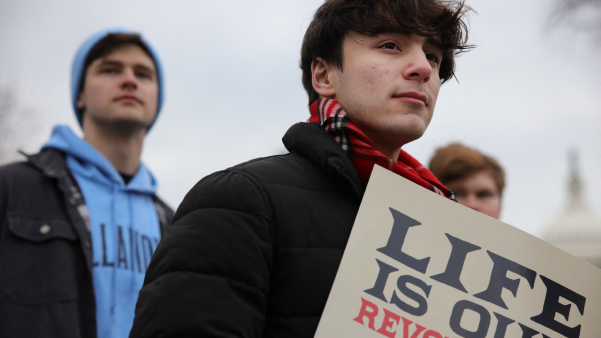Since bitcoin’s creation in 2008, many evangelicals have eyed the rise of digital currency with skepticism. Focus on the Family, citing financial adviser Dave Ramsey, compared cryptocurrency to risky strategies like day trading and issued Proverbs-style warnings against seeking to gain riches quickly. Other Christian resources give similar advice, comparing crypto to gambling.
Now, some evangelicals, such as the makers of the God Bless Bitcoin documentary, have become crypto enthusiasts—with the leader of the free world on their side.
“[President Donald Trump’s] big appeal, at least since he entered politics, is to make people feel like they are a part of something,” said William Schultz, assistant professor of American religions at the University of Chicago’s Divinity School. Now supporters can join Trump’s crypto empire. Political scientists and ethics experts say Trump’s cryptocurrency ventures raise conflict-of-interest concerns, trample long-held norms that risk degrading trust in the US government, and pave the way for more corruption from both political parties.
Even though he may not be actively making personal business decisions—Trump has handed control of his business affairs to his sons—“he still benefits from all of his family’s business interests and from their companies,” said Mark Caleb Smith, director of the center for political studies at Cedarville University. It’s a stark departure from previous presidents—every president since the 1970s placed their assets in blind trusts to avoid even the appearance of profiting off the presidency.
With murky origins, cryptocurrency is the Wild West in the financial world. It remains a largely unregulated digital frontier despite a veneer of transparency. The transactions appear on a public ledger, but the identities of participants are anonymous. Digital currency, according to Devin Singh, associate professor of religion at Dartmouth College, appeals to both libertarians and anarchists, who from opposite ends of the political spectrum “see in cryptocurrencies a basis for communal transactions that circumvent state oversight and control.”
That’s made crypto a safe haven for bad actors in the underworld, and it’s partly why “the US, which is the global financial policeman, doesn’t traditionally like crypto,” said Derek Scissors, an American Enterprise Institute senior fellow with an expertise in economics.
Two countries have made cryptocurrency legal tender: El Salvador and the Central African Republic. One reason crypto hasn’t caught on as legal tender for more countries, Singh told Christianity Today: “It was not designed to function as a legal, state-backed currency.”
The Trump administration is steering the United States in a pro-crypto direction. Crypto-related political action committees and other groups spent more than $200 million during the 2024 campaign for pro-crypto candidates. Trump earned crypto support after issuing a campaign promise to make the United States the “crypto capital of the planet.”
Once on record as a crypto skeptic, Trump was not amused when mainstream financial institutions like Deutsche Bank said they wouldn’t do business with him after the January 6 Capitol riot. Now, while Trump is known as a real estate mogul, some estimates hold that around 40 percent of his net worth is bound up in various crypto assets.
Trump has a personal digital meme coin, $TRUMP. Meme coin is more of a collector’s item than an actual currency. A particular meme coin has no inherent value other than its association, which could be with celebrities or public figures, including presidents. Earlier this month, Trump encouraged people to invest in $TRUMP for the chance of face time with him. The top 220 holders of the token will be invited to a private reception Thursday at Trump National Golf Club near Washington, DC.
The invite caused the value of $TRUMP to spike, giving the Trumps more than $1.3 million in fees alone, which are generated whenever someone buys or sells the meme coin. Others, seeing the bump, seized the opportunity to sell their holdings and rake in the cash.
Some who invested have openly said they bought it in hopes of influencing US policy if they do have Trump face time. One example: Javier Selgas, CEO of a cross-border transportation logistics firm, said he would buy $20 million worth of $TRUMP coins as a way to advocate for free trade between Mexico and the US in the midst of the trade war.
Trump’s crypto empire encompasses Trump Digital Trading Card non-fungible tokens, along with Donald and Melania Trump meme coins, a Bitcoin mining business, and other digital plans in the works. His sons Eric and Don Jr., and two other entrepreneurs also manage a crypto firm, World Liberty Financial, which lists the president as its “chief crypto advocate.”
Shortly before November’s election, Trump posted on X encouraging followers to buy the crypto firm’s tokens. The group offered other blockchain companies a partnership where the firms would each buy the other’s digital tokens for “exposure and credibility,” according to The New York Times. Several firms rejected the pitch, with executives telling the Times they considered the offer unethical. But after Trump won the White House, others rushed to invest, leading to most of the $550 million in sales happening after November.
During the 2024 campaign, Trump spoke at the annual bitcoin conference, where he pledged to depart from the Biden administration’s skeptical—critics would say hostile—approach to crypto. “You’re going to be very happy with me,” he predicted.
Pro-crypto policies came in short order. His administration shuttered a Securities and Exchange Commission (SEC) unit charged with investigating fraud in digital assets. One dropped case was against a crypto firm, Ripple, which had donated nearly $5 million to Trump’s inauguration fund. Justin Sun, a Chinese crypto entrepreneur who invested $75 million purchasing World Liberty Financial’s tokens, also saw his case put on hold.
The president also created a “Strategic Bitcoin Reserve.” It’s a “virtual Fort Knox for digital gold,” Trump said. The initial reserve will be from bitcoin holdings the government already has, around $17 billion by some estimates, the result of legal cases against criminal operations or civil forfeitures. Another executive order directed federal agencies to develop strategies to obtain more bitcoin, with the caveat that the means must be “budget-neutral” and not cost taxpayers.
Whether to be friendly or hostile toward crypto is a legitimate policy debate, economist Scissors said. “Where it gets difficult is you’re now taking a policy position which happens to align with your family’s financial situation.” If crypto loses value, he said, “we’re going to have a skewed US government response where Trump bails out his family, and it is going to harm ordinary Americans because the Trump family will come first.”
“I don’t think it’s a matter of ‘This will totally tank the economy,’” Schultz with the University of Chicago said. “It’s more a question of, when there are inevitable costs or when the industry struggles, Trump is going to prioritize the leaders of this industry who have supported him.”
The Trump family’s crypto ventures also give foreign investors a convenient way to get close to him—without a federal ban like the one preventing foreign donations to political campaigns. Instead of booking a suite of rooms in the since-shuttered Trump hotel that operated during his first term or schlepping to Mar-a-Lago to haunt his golf courses, dignitaries or investors from anywhere in the world can curry favor with the president by simply a click of their computer mouse. “Basically an open door to bribery,” said Joseph Laycock, an associate professor of religious studies at Texas State University.
Singh, with Dartmouth, said it’s too soon to say whether Trump is guilty of a conflict of interest. “Presidents have had influence over monetary policy in the past,” he said, noting Richard Nixon’s de-linking of the US dollar from gold. But he added that the potential for corruption is higher here: “You can manufacture these large swings in value, as we’ve seen recently with the various meme coins that have been associated with the administration.”
The White House has denied wrongdoing. “I can assure you the president acts with only the interests of the American public in mind, putting our country first and doing what’s best for our country. Full stop,” White House press secretary Karoline Leavitt said.
Smith at Cedarville said it is troubling to even have to ask the question of whether the Trump family’s financial ties to crypto create a conflict of interest. Are people dropping millions into World Liberty Financial hoping for pardons? Are buyers of the Trump and Melania Trump meme coins hoping for access to the president? It’s hard to say.
“When you have a public official like the president making decisions about policy, you really don’t want there to be private concerns at all driving their decision-making, even the hint of a private concern,” Smith said. “This whole crypto approach from the Trumps really clouds that issue pretty dramatically. I think it’s ripe for corruption.”















